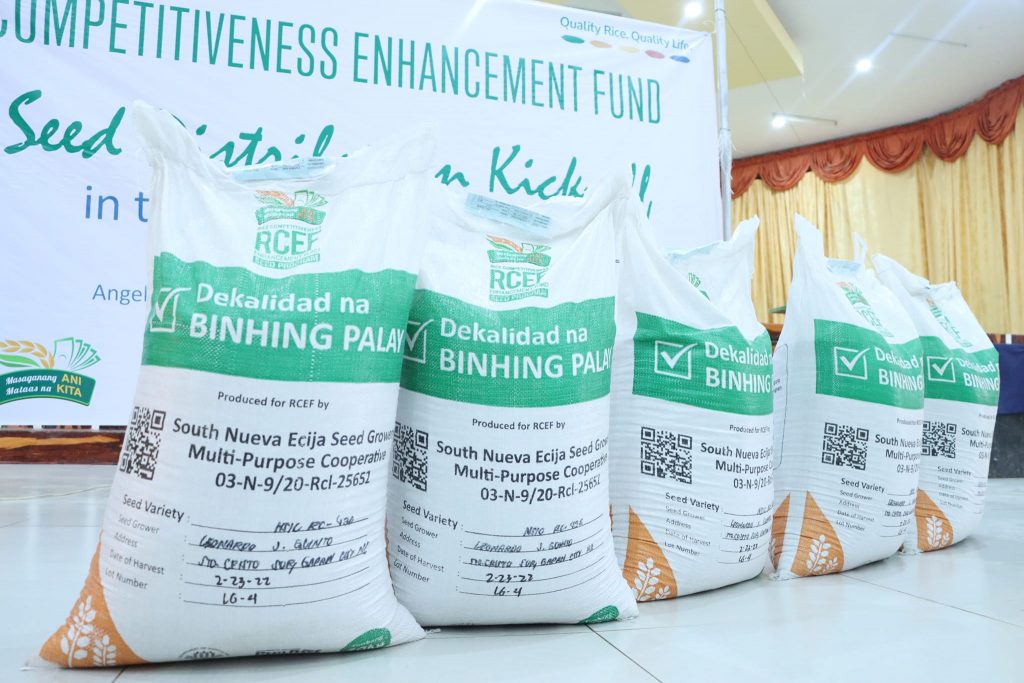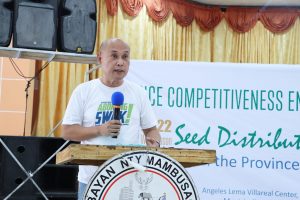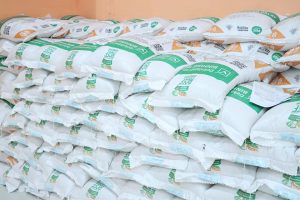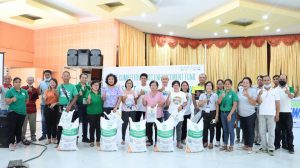
Geared to help farmers cope with the hurdles in rice-growing amid the spiking prices of inputs, the Department of Agriculture (DA) Philippine Rice Research Institute (PhilRice) rolled out the ‘Abonong Swak’ Campaign and the distribution of inbred seeds for the wet planting season in Panay from May 4 to 6.
DA Deputy Spokesperson Dr. Rodolfo Estigoy said that the ‘Abonong Swak’ campaign supports the agency’s Balanced Fertilization Strategy, highlighting the importance of combining organic and inorganic fertilizer to reduce production costs while ensuring yield.
“Una na nating nilunsad ang Abonong Swak sa PhilRice sa Nueva Ecija, pangalawa dito sa mga probinsya sa Panay, at sa susunod na linggo sa Bohol. Nilalayon ng information campaign na ito na maipalaganap ang paggamit ng inorganiko at organikong pataba. Hindi lang dapat tayo nakadepende sa inorganikong abono na inaangkat sa ibang bansa (sic),” said Estigoy who introduced the fertilizer saving technology to farmers in Numancia, Aklan, and Mambusao, Capiz.

In collaboration with the DA Regional Offices, Agricultural Training Institute, and Bureau of Soils and Water Management, DA-PhilRice initiated the info drive in low-yielding provinces and will also put up demonstration sites nationwide to showcase the Abonong Swak technology.
Meanwhile, Dr. Diadem Gonzales-Esmero, chief of the PhilRice Development Communication Division, explained to farmers the different recommended combinations of inorganic and organic fertilizers based on targeted production volume.

Combo 1 – 3,000 to 4,000 kilograms per hectare target production
Combo 2 – 5,000 to 6,000 kilograms per hectare target production
Combo 3 – 7,000 to 8,000 kilograms per hectare target production
“Ngayong nilunsad natin ang kampanya para matulungan ang mga magsasaka na mapababa ang kanilang gastos sa pagpapataba at hindi naman mapapabayaan ang kanilang ani. Abonong swak, swak sa budget, swak sa palay,” she said.
Esmero urged rice farmers to utilize decision tools downloadable on mobile phones. With the Leaf Color Chart, Minus One Element Technique, Rice Crop Manager Advisory Service, and the use of Soil Test Kits, rice farmers can determine the right element, amount, and the timing of fertilizer application.
Following the ‘Abonong Swak’ technology, farmers could save P2,000 to P4,000 a hectare.
Lucy Hindrana of Numancia, Aklan, expressed her support for adopting the technology amid the unprecedented increase in the cost of synthetic fertilizer from P1,000 to P3,000 per bag.
“Sana sa pamamagitan ng teknolohiya sa Abonong Swak, magkaroon kami ng kaunting gastos at aning masagana,” said Hindrana who also mentioned that they have been processing and applying organic fertilizer out of farm wastes, rice hay, and animal manure to their rice areas two months before land preparation.
On the other hand, PhilRice Negros rolled out the distribution of certified inbred seeds to 50 farmers each from the municipalities of San Remigio in Antique, Numancia, Aklan, and Mambusao, Capiz. PhilRice apportioned 194,280 bags of certified inbred seeds under the DA Rice Competitiveness Enhancement Fund (RCEF) for Panay farmers this wet planting season.

The allotted seeds will be planted in at least 97,000 hectares of target farms in Aklan, Antique, and Capiz, according to PhilRice Negros Regional RCEF coordinator Fennie Lyn Pantin.
Farmers listed in the Registry System for the Basic Sectors in Agriculture will have access to high-yielding inbred seeds such as NSIC Rc 222, NSIC Rc 216, NSIC Rc 480, and PSB Rc10 projected to level up harvests and reduce the cost of producing rice.
Based on the guidelines, PhilRice will provide qualified farmers with one bag of inbred seeds at 20 kilograms per bag for every half a hectare farm.
Meanwhile, DA Western Visayas Regional Information Officer James Earl Ogatis urged RCEF-seed recipients to participate in the Palay Eskwelahan: School On-Air on Smart Rice Agriculture (SOA-SRA), which will start this May.
The SOA seeks to equip farmers on the entire rice value chain featuring innovative approaches and modern and climate-smart rice production technologies.
Agricultural Program Coordinating Officers and representatives from the provincial and municipal agriculture offices were also present at the launching and distribution events. (DA-RAFIS 6 SMHToreno)
